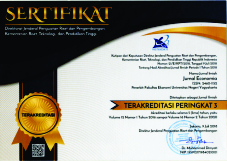Institutionalization of Performance Accountability System for Government Institutions in Malang City Government
Downloads
Abstract: Institutionalization of Performance Accountability System for Government Institutions in Malang City Government. This study aimed to understand the institutionalization of Malang City Government's SAKIP with accordance to Presidential Regulation No. 29/2014. This study found high commitment to support national development plan, and it affected planning, budgeting, and Regional Organizations (OPD) internal evaluation positively. This study also found indications of isomorphism and decoupling. The evidences of isomorphism were as follows; the existence of formal insistence of strict laws and informal insistence of the East Java Provincial Government as the indication of coercive; the adoption of Civil Servant's Performance Agreement formulation as mimetic view; joint effort for internal capacity building among KEMENPAN-RB, East Java Provincial Government, and PT. Jakarta Traspac as a normative proof. Meanwhile, indications of decoupling were as follows; the OPD's mindset was not an outcome-oriented mindset, low awareness of the importance of creating performance data management Standard Operating Procedure (SOP), and low utilization of performance information.
Keywords: SAKIP, Isomorphism, decoupling
Abstrak: Institusionalisasi Sistem Akuntabilitas Kinerja Instansi Pemerintah di Pemerintah Kota Malang. Penelitian ini bertujuan untuk memahami institusionalisasi SAKIP di Pemerintah Kota Malang sesuai dengan Perpres No. 29 tahun 2014. Penelitian ini menggunakan paradigma post positive. Analisis dan interpretasi data dilakukan berdasarkan teori New Institutional Sociology (NIS). Hasil penelitian menunjukkan tingginya komitmen untuk mendukung rencana pembangunan nasional yang berdampak pada pembenahan perencanaan, penganggaran, dan evaluasi internal Organisasi Perangkat Daerah (OPD). Hasil analisis menemukan indikasi isomorphism dan decoupling. Terjadinya isomorphism dibuktikan dengan: desakan formal dari aturan hukum dan desakan informal dari Pemerintah Provinsi (Pemprov) Jatim merupakan gejala coercive; pengadopsian penyusunan perjanjian kinerja Aparatur Sipil Negara sebagai gambaran mimetic; dan kerjasama antara KEMENPAN-RB, Pemprov Jatim, dan PT. Jakarta Traspac untuk peningkatan kemampuan internal organisasi merupakan bukti normative. Indikasi decoupling ditunjukkan oleh mindset OPD yang belum berorientasi outcome, rendahnya kesadaran penyusunan Standard Operating Procedure (SOP) pengelolaan data kinerja, dan rendahnya pemanfaatan informasi kinerja.
Kata kunci: SAKIP, Isomorphism, decoupling
Downloads
Akbar, R. (2011). Performance Measurement and Accountability in Indonesian Local Government. Disertasi. Western Australia: Curtin University.
Burns, J., & Scapens, R.W. (2000). Conceptualizing management accounting change: an institutional framework. Management Accounting Research, 11(1), 3-25.
Carruthers, B.G. (1995). Accounting, ambiguity, and the new institutionalism. Accounting, Oganizations and Society, 20(4), 313-328.
DiMaggio, P.J., & Powell, W.W. (1983). The iron cage revisited: institutional isomorphism and collective rationality in organizational fields. American Sociological Association, 48(2), 147-160.
Djamhuri, A. (2009). A Case Study of Govermental Accounting and Budgeting Reform at Local Authority in Indonesia: An Institutionalist Perspective. Disertasi. Malaysia: Universiti Sains Malaysia.
Guthrie, J. (1998). Aplication of accrual accounting in the australian public sector-rhetoric or reality. Financial Accountability & Management, 14(1), 1-19.
Hariadi, B. (2013). Revitalisasi Pabrik Gula Rajawali Mengungkap Dinamika Proses Institusionalisasi, Studi Kasus PG Krebet Baru Malang. Disertasi. Malang: Universitas Brawijaya
Instruksi Presiden No.7 Tahun 1999. Akuntabilitas Kinerja Instansi Pemerintah.
Jurnali, T., & Siti-Nabiha, A.K. (2015). Performance management system for local government: the Indonesian experience. Global Business Review, 16(3), 351-63.
Meyer, J.W., & Rowan, B. (1977). Institutionalized organizations: formal structure as myth and ceremony. American Journal of Sociology, 83(2), 340-363.
Miles, M.B., & Huberman, A.M. (2007). Analisis Data Kualitatif, Buku Sumber tentang Metode-metode Baru. Jakarta: Universitas Indonesia Press.
Nurkhamid, M. (2008). Implementasi Inovasi Sistem Pengukuran Kinerja Instansi Pemerintah. Jurnal Akuntansi Pemerintah, 3(1), 45-76.
Peraturan Daerah Kota Malang Nomor 7 Tahun 2014. Rencana Pembangunan Jangka Menengah Daerah Kota Malang Tahun 2013-2018.
Peraturan Daerah Kota Malang Nomor 7 Tahun 2016. Pembentukan dan Susunan Perangkat Daerah.
Peraturan Menteri Pendayagunaan Aparatur Negara dan Reformasi Birokrasi Nomor 53 Tahun 2014. Petunjuk Teknis Perjanjian Kinerja, Pelaporan Kinerja, dan Tata Cara Reviu atas Laporan Kinerja Instansi Pemerintah.
Peraturan Menteri Pendayagunaan Aparatur Negara dan Reformasi Birokrasi Nomor 12 Tahun 2015. Pedoman evaluasi Sistem Akuntabilitas Kinerja Instansi Pemerintah.
Peraturan Pemerintah Nomor 8 Tahun 2006. Pelaporan Keuangan dan Kinerja Instansi Pemerintah.
Peraturan Presiden Nomor 29 Tahun 2014. Sistem Akuntabilitas Kinerja Instansi Pemerintah.
Peraturan Walikota Malang Nomor 8 tahun 2015. Pedoman Penyusunan Perjanjian Kinerja dan Pelaporan Kinerja.
Peraturan Walikota Malang Nomor 30 Tahun 2015. Penyempuranaan Indikator Kinerja Daerah Kota Malang Tahun 2013-2018.
Peraturan Walikota Malang Nomor 39 Tahun 2015. Petunjuk Pelaksanaan Reviu Laporan Kinerja Pemerintah Daerah dan Evaluasi Sistem Akuntabilitas Kinerja Instansi Pemerintah.
Peraturan Walikota Malang Nomor 94 Tahun 2015. Indikator Kinerja Utama di Lingkungan Pemerintah Kota Malang.
Sihaloho, F.L., & A. Halim. (2005). Pengaruh Faktor-Faktor Rasional, Politik dan Kultur Organisasi Terhadap Pemanfaatan Informasi Kinerja Instansi Pemerintah Daerah. Paper dipresentasikan dalam Simposium Nasional Akuntansi VIII, Solo.
Sofyani, H., & Akbar, R. (2013). Hubungan Faktor Internal Institusi dan Implementasi Sistem Akuntabilitas Kinerja Instansi Pemerintah (SAKIP) di Pemerintah Daerah. Jurnal Akuntansi dan Keuangan Indonesia, 10(2), 184-205.
Solikin. (2005). Accountability Reporting In Indonesia: When Self-serving Attreibutions Exaggerate Perceived Performance. Jurnal Akuntansi Pemerintah. 1(1).
Undang-Undang Nomor 17 Tahun 2003. Keuangan Negara. Negara Republik Indonesia.
United Nations Development Program (UNDP). (1997). Governance And Sustainable Human Development. A UNDP Policy Document.
Khalid, F. (2010). Akuntabilitas keuangan dan kinerja: studi kasus pada direktorat pembinaan SLB. Tesis. Jakarta: Universitas Indonesia.
World bank, (1994). Governance: The World Bank's Experience. Diakses dari http://www.worldbank.org. pada tanggal 3 Maret 2017.















